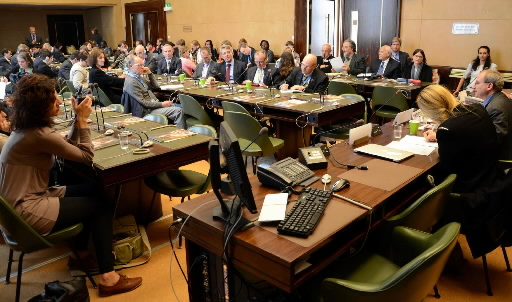Japan’s Non-nuclear Diplomacy Falters, Part 1
May 10, 2013
The World Eyes the A-bombed Nation
by Michiko Tanaka, Staff Writer
Japan’s refusal to sign joint statement prompts dismay
GENEVA—The number of those who question why the Japanese government refused to sign a joint statement on the humanitarian impact of nuclear weapons continues to grow. Japan rebuffed this statement issued at the Second Preparatory Committee for the 2015 Nuclear Non-proliferation Treaty (NPT) Review Conference, held in Geneva, Switzerland. The decision highlights Japan’s contradictory posture in calling for the abolition of nuclear weapons while continuing to rely on the U.S. nuclear umbrella. Unable to state firmly that nuclear weapons are an absolute evil, the nation’s non-nuclear diplomacy is waning in influence.
One week after the joint statement was presented, the Swiss government hosted a symposium on the humanitarian impact of nuclear weapons on April 30 in Geneva.
Addressing about 100 representatives from national governments and non-governmental organizations, an official from Switzerland’s Federal Department of Foreign Affairs stressed that nuclear disarmament, now at an impasse, could potentially be advanced by focusing on the inhumanity of nuclear weapons. Switzerland played a key role in coordinating the support for the joint statement against the use of nuclear weapons. The Japanese government, with its conflicted attitude toward nuclear weapons, was unable to deliver a message at this symposium.
Joint statement not detrimental to alliance
Norway was one of the nations that endorsed the joint statement. Inga M.W. Nyhamar, Deputy Director General of the Section for Disarmament and Non-proliferation in Norway’s Ministry of Foreign Affairs, emphasized that its support for the statement will not be a detriment to ties between Norway and the United States.
Norway is a member of the North Atlantic Treaty Organization (NATO) and, like Japan, the country’s security is dependent on the U.S. nuclear umbrella. Still, the northern European nation holds an uncompromising attitude toward nuclear weapons and their inhumanity, a position articulated in the joint statement. Ms. Nyhamar expressed regret, saying that Japan, which suffered the atomic bombings, has an important role to play and that she had hoped it would back the statement.
Three other NATO allies, Denmark, Iceland, and Luxembourg, also signed the statement. Uffe A. Balslev, Ambassador for Disarmament, Non-Proliferation and Arms Control of Denmark said, “Denmark, just like Japan, supports the traditional approach to the nuclear issue, in which we, together with nuclear states, progress in stages toward a world without nuclear weapons.” Mr. Balslev said that the statement, which categorically rejects nuclear weapons, does not run counter to his nation’s stance.
“It is in the interest of the very survival of humanity that nuclear weapons are never used again, under any circumstances.” It was this wording in the statement that the Japanese government found objectionable. Japan’s Foreign Ministry explained that the nuclear umbrella is necessary to safeguard the nation, which must contend with advances in North Korea’s nuclear weapons program and nuclear-armed China.
South Africa, which helped draft the document, made comments that were highly critical of Japan’s stance. Abdul Samad Minty, Permanent Representative of South Africa to the United Nations in Geneva, said, “Are there any circumstances where the use of nuclear weapons is justified? Are they suggesting that nuclear weapons can be used against North Korea?”
Going against the tide
This year marks the 68th anniversary of the atomic bombings. More and more people around the world are learning about the tragic conditions that befell Hiroshima and Nagasaki, while an increasing number of nations now supports the elimination of nuclear weapons, a position which Japan has advocated. This is clearly demonstrated in the more than 70 backers of the statement. However, the A-bombed country, which should be spearheading abolition efforts, has turned its back on this new tide, prompting dismay and criticism.
Takao Takahara, a professor of international politics at Meiji Gakuin University, observed the debate at the preparatory committee. Professor Takahara believes that Japan has conveyed the wrong message and its attitude as the A-bombed nation cannot help but be questioned.
Keywords
The North Atlantic Treaty Organization (NATO)
The North Atlantic Treaty Organization (NATO) was established in 1949 as a military alliance of western nations to counter the threat from the former Soviet Union. The 12 founding members were the United States, Canada, and ten countries of Western Europe. If an armed attack is made on any member state, it is considered an attack on the alliance as a whole, and necessary action, including the use of armed force, will be immediately pursued. NATO, headquartered in Brussels, Belgium, currently has 28 member nations.
(Originally published on May 1, 2013)








